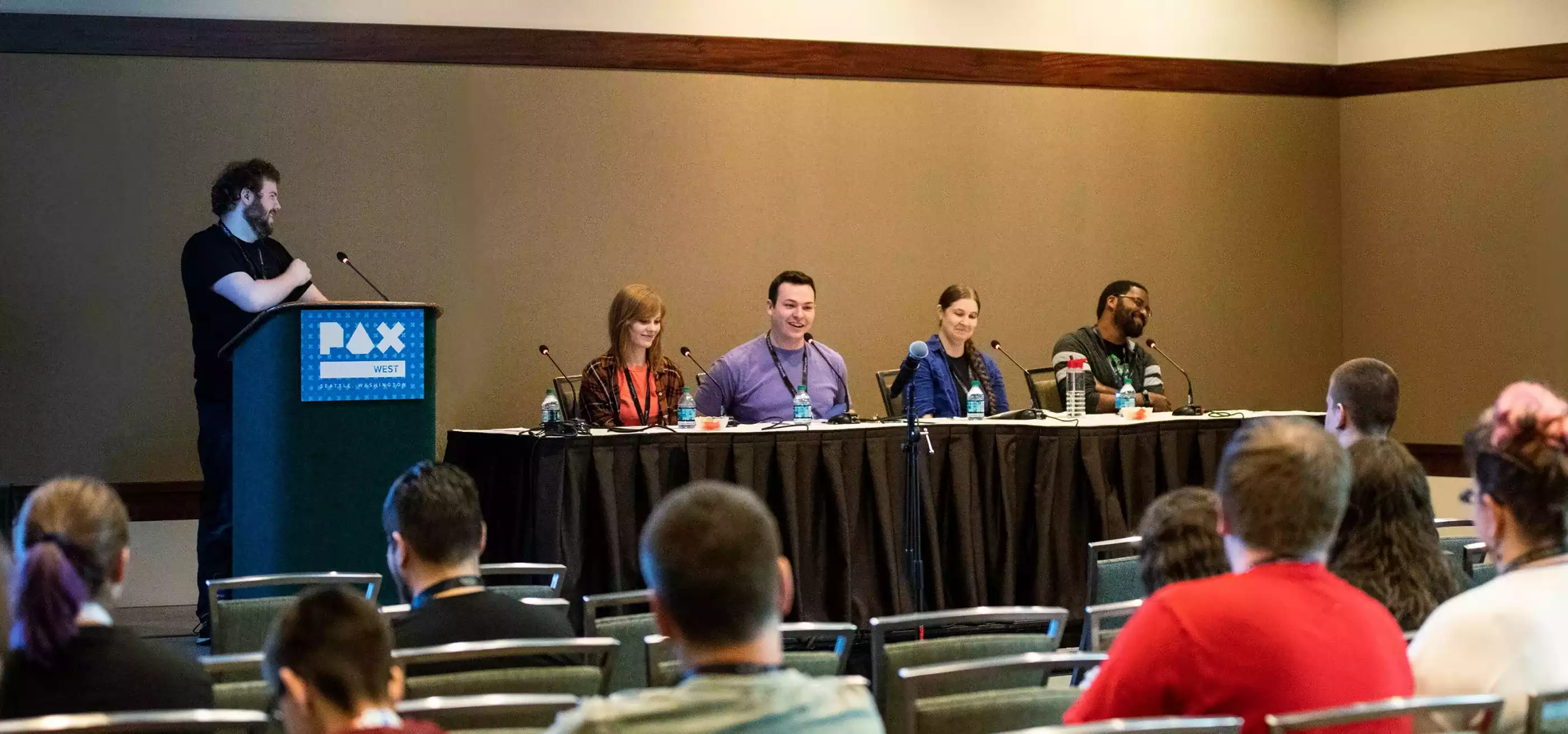The DigiPen community is no stranger to Seattle’s PAX West, with many students, faculty, and alumni having presented and shown off their game projects during the annual gaming convention. This year’s four-day event, however, featured a particularly special gathering of DigiPen Dragons.
That’s because PAX West attendees got a chance to hear from several DigiPen alumni during a September 2 panel titled “DigiPen Presents: Back When I Was 8-Bit – The Game Developer Chronicles.” The gathered panelists each detailed their unique academic journeys through DigiPen and how their time at the school shaped their future careers.
The four alumni panelists were Lauren Stutzriem (BFA in Digital Art and Animation, 2017), Allan Deutsch (BS in Computer Science, 2017), Victoria Smith (BS in Computer Science in Real-Time Interactive Simulation, 2009), and Stephen Scott (BFA in Digital Art and Animation, 2010), with fellow DigiPen graduate Devin Jensen (BS in Computer Science, 2017) serving as moderator for the hour-long session. The event took place in PAX’s Cat Theatre at the Washington State Convention Center.
While each panelist described their own path that led them to DigiPen, they all described a happy accident or interaction with an educator who played a key role in their decision to attend. Smith, for instance, originally sought to go into biology, but a programming class that she took at a community college is what suddenly drew her into software development.
“My ambition was to be a histologist,” said Smith, now a software engineer at Uber Entertainment. “I took a programming class just for fun as an elective and got hooked. I thought it was amazing: ‘Look what I made the computer do!’”
For Stutzriem, who now works as a storyboard artist for a startup animation studio, it was the brutally honest encouragement of a high school art teacher that opened her to the possibility of art and animation as a career. “Lauren, you’re a really, really bad student,” she recalled him saying, “but if you just tried a little harder at art, I bet you could get into [art school].” As it turned out, it was just the spark she needed to start taking her talent more seriously, and she eventually found her way into DigiPen’s rigorous BFA program.
Each panelist noted the amount of work and effort it took to succeed at DigiPen, but they also celebrated the way that the workload helped prepare them for working in the industry. The occasional struggle also magnified the sense of accomplishment in unexpected ways. Smith initially felt that she didn’t have the mathematics background needed to thrive in her own degree program, but after “kicking butt” in her introduction to linear algebra course, she gained the confidence she needed. Scott, meanwhile, recounted his own early confidence boost when he excelled at a freshman Acting for Animation course that highlighted his particular knack for public speaking and engaging with others.
“When I got into that class and saw how much everyone was struggling because… [you] have to go up there, [you] have project in front of people, [whereas] for me, it was just fine,” said Scott, now an associate game designer at Microsoft.
Panelists also called out the uniqueness of the team project courses, with Deutsch and Stutzriem listing them among their favorite classes during their time at DigiPen. Stutzriem likened the team projects to becoming “an indie studio for a year,” saying that the team-oriented environment helped her learn things about herself that otherwise could have taken years in the industry. The course also gave her the chance to turn a childhood fascination with Nancy Drew interactive games into her senior project, the IGF-nominated Penny Blue Finds a Clue.
Deutsch, now a program manager in the Advanced Technology Group at Microsoft, found the project courses liberating. It’s a feeling that worked its way into his team’s senior-year project, the alternative-control-scheme game Sand Garden, a real-time strategy game in which players interact with an actual box of kinetic sand to manipulate an on-screen environment. Their belief in the project and their ability to execute on an unusual concept spurred them to advocate hard for their game and ultimately led Deutsch and his teammates to explain to DigiPen President Claude Comair “why they needed a thousand dollars to buy a bunch of dirt” — a line which drew a big laugh from the attendees. Fortunately, the investment in the project turned out to be money well spent, and Sand Garden would go on to be selected for the alt.ctrl.GDC exhibition at the Game Developers Conference in 2017.
The panel was organized in commemoration of DigiPen’s 30th anniversary. Throughout the weekend, DigiPen alumni also presented on other panels and presentations. Elsewhere in the convention center, attendees had the chance to compete for prizes at DigiPen’s student-run arcade booth, which featured 18 student games this year.
